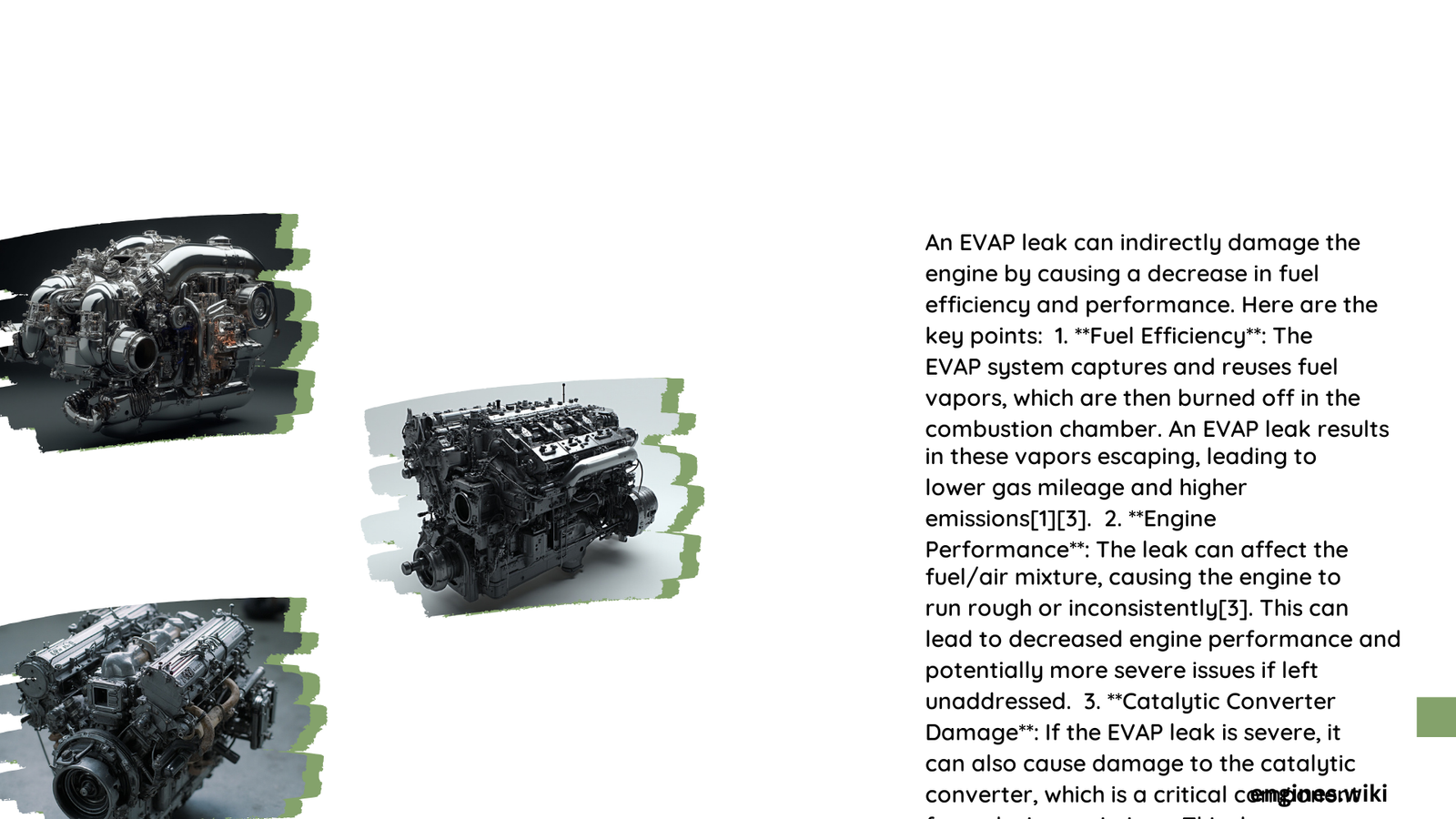An EVAP (Evaporative Emission Control System) leak can potentially impact engine performance and efficiency, but it doesn’t directly cause immediate mechanical damage. While not an immediate threat to the engine’s integrity, an EVAP leak can lead to decreased fuel efficiency, increased emissions, and potential long-term issues if left unaddressed. Understanding the implications of an EVAP leak is crucial for maintaining your vehicle’s performance and complying with emissions standards.
What is an EVAP System and How Does it Function?
The EVAP system is designed to prevent fuel vapors from escaping into the atmosphere. It captures these vapors and redirects them back to the engine for combustion. Key components include:
- Fuel tank
- Charcoal canister
- Purge valve
- Various hoses and connections
When functioning correctly, this system helps maintain fuel efficiency and reduces harmful emissions.
Can an EVAP Leak Directly Damage the Engine?

An EVAP leak does not typically cause direct mechanical damage to the engine. However, it can lead to several indirect issues:
- Decreased fuel efficiency
- Increased emissions
- Potential damage to other components over time
While these issues don’t immediately harm the engine, they can affect its performance and longevity if left unaddressed.
What Are the Symptoms of an EVAP Leak?
Recognizing the signs of an EVAP leak is crucial for timely diagnosis and repair. Common symptoms include:
- Check Engine Light illumination
- Fuel odor, especially near the gas tank
- Difficulty starting the engine
- Failed emissions test
- Decreased fuel efficiency
If you notice any of these symptoms, it’s advisable to have your vehicle inspected by a qualified mechanic.
How Does an EVAP Leak Affect Fuel Efficiency?
An EVAP leak can significantly impact your vehicle’s fuel efficiency:
| Severity of Leak | Estimated MPG Reduction |
|---|---|
| Minor | 1-3 MPG |
| Moderate | 3-5 MPG |
| Severe | 5+ MPG |
These figures are estimates and can vary based on vehicle make, model, and driving conditions.
What Long-term Effects Can an EVAP Leak Have?
While not immediately damaging to the engine, prolonged neglect of an EVAP leak can lead to:
- Increased emissions
- Potential damage to the catalytic converter
- Reduced overall vehicle performance
- Higher fuel costs due to decreased efficiency
Addressing an EVAP leak promptly can prevent these long-term issues and maintain your vehicle’s performance.
How is an EVAP Leak Diagnosed?
Diagnosing an EVAP leak typically involves:
- Scanning for diagnostic trouble codes (DTCs)
- Smoke testing the EVAP system
- Pressure testing the fuel system
- Visual inspection of EVAP components
Professional mechanics use specialized equipment to accurately locate and assess EVAP leaks.
What Are the Repair Options for an EVAP Leak?
Repair options depend on the location and severity of the leak:
- Replacing faulty hoses or connections
- Repairing or replacing the purge valve
- Addressing issues with the gas cap
- Replacing the charcoal canister
The cost of repairs can vary widely, from under $100 for a simple fix to over $500 for more complex issues.
Can You Drive with an EVAP Leak?
While you can technically drive with an EVAP leak, it’s not recommended for several reasons:
- Decreased fuel efficiency
- Increased emissions
- Risk of failing emissions tests
- Potential for more severe issues if left unaddressed
It’s best to have the leak repaired as soon as possible to maintain your vehicle’s performance and efficiency.
How Can You Prevent EVAP Leaks?
Preventing EVAP leaks involves regular maintenance and attention to your vehicle:
- Ensure the gas cap is properly tightened after refueling
- Have regular vehicle inspections
- Address Check Engine Light warnings promptly
- Maintain your vehicle according to the manufacturer’s recommendations
By following these preventive measures, you can reduce the likelihood of developing EVAP leaks and maintain your vehicle’s performance.
Conclusion
While an EVAP leak won’t directly damage your engine, it can lead to decreased performance, increased emissions, and potential long-term issues if left unaddressed. Regular maintenance and prompt attention to warning signs can help prevent EVAP leaks and maintain your vehicle’s efficiency and performance. If you suspect an EVAP leak, it’s best to have your vehicle inspected by a qualified mechanic to ensure proper diagnosis and repair.
References:
1. Jake Electronics: What Is An EVAP System Leak? Causes, Diagnosis, and Solution
2. Merrill Automotive: Can You Safely Drive With an EVAP Leak?
3. JB Tools Inc.: What Is an EVAP System Leak and How To Diagnose?
